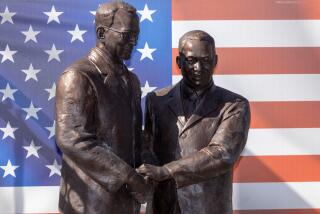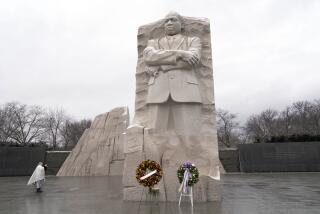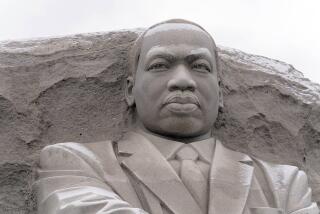Lloyd Davis, 79; a principle architect of Martin Luther King Jr. federal holiday
- Share via
In the fall of 1983 a new federal holiday was born, full of promise and potential. Months later Lloyd Davis was placed in charge of a commission created to imbue the holiday with lasting meaning.
The commission’s theme for the holiday honoring the Rev. Martin Luther King Jr. was simple: “Remember. Celebrate. Act.” Its work was arduous.
“It was step by step, brick by brick, trying to build a holiday that would do justice to everything Dr. King represented,” Davis told The Times in 2006. “It would not sensationalize, but it would make the holiday part of the American conscience, a day of meaning and character.”
Davis, a principle architect of the King federal holiday and a longtime employee of the U.S. Department of Housing and Urban Development, died of colon cancer Monday at his home in Chevy Chase, Md. He was 79.
“He was a person who worked untiringly to bring about the holiday,” said King’s sister, Christine King Farris, in an interview with The Times this week. “He knew the inner workings of the government, and because of that background he was able to push forward.”
Davis was born May 4, 1928, in Chicago and graduated in 1955 from DePaul University with a bachelor’s degree in sociology. Three years later he earned a master’s in social and industrial relations from Loyola University.
In 1979 Davis left HUD, where he had been employed for many years, to work at the Martin Luther King Jr. Center for Nonviolent Social Change in Atlanta, the headquarters of a massive effort to create a King holiday led by King’s widow, Coretta Scott King.
Throughout the nation there were marches, petitions, student walkouts and a groundswell of voices demanding a holiday to honor the late civil rights activist. A long list of celebrities lent their support. Davis, a close ally of King’s widow, worked behind the scenes.
“He just wanted to orchestrate and be in the background,” said Davis’ stepdaughter, Tracy Reid, of San Anselmo, Calif. Davis is also survived by a daughter, Leigh Susan Davis, of Galway, Ireland; and a stepson, Steven P. Kirk, of Chevy Chase, Md. “He wouldn’t flaunt his own accomplishments.”
The national campaign paid off in 1983 when President Reagan signed legislation naming a federal holiday in King’s honor.
Years later Davis remembered those days as a time of constant work and vigilance, protecting the holiday’s image even before it was born. Supporters pushed to have the bill authorizing the King holiday signed into law at the White House, not at a predominantly black school in Washington, as some in the White House wanted, he said.
“We said, ‘Oh, no,’ ” Davis told a Times reporter last year. “ ‘We don’t want this to be seen as a black holiday. It’s not a black holiday. It’s a holiday for the people of America and the world.’ ”
In 1984 the Martin Luther King Jr. Federal Holiday Commission was established, and Davis was named executive director. The 40-member agency included four cabinet-level presidential appointees, senators, representatives and a wide mix of King Day supporters.
The first federal holiday was to be observed Jan. 20, 1986, giving the commission less than two years to ready the nation, “a tall order,” Davis recalled.
Early on, the commission decided to promote the holiday as a day to perform community service, “get out and do something to make this a better country.” Members did not want the holiday to become a day for shopping at the mall or lounging at the park. The theme of service echoed King’s belief in the biblical principle that greatness comes from helping others.
“It was certainly at the heart of what Mrs. King wanted and what Christine Farris King, Dr. King’s sister, wanted,” said Alan Minton, who became Davis’ assistant and later was executive director of the commission. “They were really two people who counted on Lloyd to do much of this work.”
The commission’s public service announcements, pamphlets and summits all helped spread awareness. Each state was encouraged to create its own commission to promote public service on the King holiday.
“One of the critical things was, he wasn’t going to tell people what service was,” Minton said. “Lloyd said, ‘Trust in the human spirit that they will find creative ways to help.’ ”
To encourage observance of the day, “we went to the chambers of commerce, manufacturers, the banking industry,” Davis told a Times reporter in 2006. “We got Wall Street to celebrate the holiday, and that was very important.”
Over the years more and more Americans began observing the day with community service events. In the mid-1990s Davis returned to HUD, where his long career was distinguished by his work in the fair housing and equal opportunity section, where he created voluntary fair housing agreements. Davis, a special assistant in the office of enforcement and programs, never retired and was still working until about three weeks ago.
Last year as he reflected on the King holiday, Davis said public service was still more prevalent than department store sales. “All the work people put into crafting the holiday, giving it form and shape and meaning, made it something it might not have been,” he told a Times reporter.
Memorial donations may be sent to the King Center, 449 Auburn Ave. NE, Atlanta, GA 30312
--
More to Read
The biggest entertainment stories
Get our big stories about Hollywood, film, television, music, arts, culture and more right in your inbox as soon as they publish.
You may occasionally receive promotional content from the Los Angeles Times.










